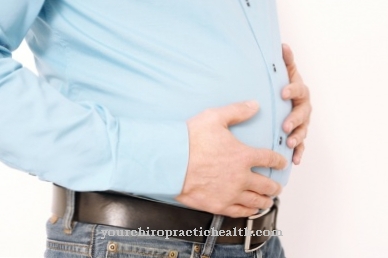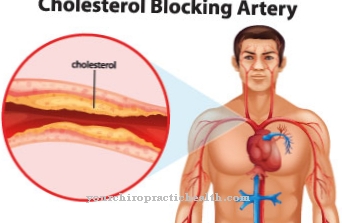Stomach cancer or medically too Gastric cancer is a malignant tumor disease in the stomach. This often leads to major changes in the cells (cell mutation), with the growth of the stomach cells being greatly accelerated. The most common causes are smoking, inflammation of the stomach lining, alcohol, and foods rich in fat and salty.
What is stomach cancer?

© designua - stock.adobe.com
Of the Stomach cancer, also as Gastric cancer is a malignant cancer of the stomach. Stomach cancer is a rather rare form of cancer in Germany; only about 10 in 100,000 people develop gastric cancer annually. Mainly people who have passed the age of 50 develop this type of cancer. Stomach cancer is rather rare in people under 30.
Until the 1940s, stomach cancer was the most common cancer in Europe - thankfully this has changed due to improved eating habits. In gastric cancer, the cells in the stomach divide too quickly and malignant neoplasms, usually in the form of a tumor, develop.
causes
As the main causes of Stomach cancer In general, an unhealthy diet applies as well as excessive consumption of alcohol. A diet with high salty content in particular can trigger stomach cancer. Instead, the diet should include fresh fruit and vegetables. Grilled and smoked dishes are also only to be enjoyed in moderation.
Stomach cancer also affects smokers much more often; It is estimated that they are about three times as likely to develop stomach cancer as non-smokers. The carcinogenic substances contained in cigarettes reach the stomach directly via the saliva. It has not yet been clearly established whether stomach cancer is hereditary. However, the risk of developing stomach cancer is significantly higher if a family member has already had stomach cancer.
Symptoms, ailments & signs
Stomach cancer often has no or only unspecific signs at the beginning. Symptoms such as nausea, loss of appetite and weight loss can have different causes and are not yet indicative of stomach cancer. Gastric cancer manifests itself in that the symptoms persist over a longer period of time and increase in intensity over time. Most gastric cancer develops unnoticed.
The symptoms appear harmless at first, but increase in intensity and lead to a gradual deterioration in wellbeing. Symptoms include difficulty swallowing, bad breath, heartburn, and belching. Often there are nausea and vomiting as well as flatulence. A mild fever may persist for days or weeks and may get worse as the tumor grows.
Loss of appetite is also typical, which often leads to weight problems and deficiency symptoms. Some people suddenly experience an aversion or intolerance to meat, fruit, coffee or alcohol. Physical and mental performance decreases as the disease progresses.
If the tumor increases in size, symptoms of the gastrointestinal tract can occur. If the carcinoma blocks or narrows the exit of the stomach, a feeling of fullness can occur, often with nausea, vomiting, and heartburn. In addition, gastric bleeding may occur, which is manifested by a dark color of the stool. Vomiting of blood can also occur.
Course of disease
A Gastric cancer or. Stomach cancer can make itself felt in different ways. Food intolerance can often indicate this disease, and loss of appetite should also be observed in this context. Sudden weight loss can also indicate this condition. Most of the time, a clear sign of stomach cancer is blood in the stool. This is then almost black, shiny and smelly and is also known as a tarry stool.
Vomiting dark blood is also not uncommon. If these symptoms occur, it is best to see a doctor immediately. The symptoms of gastric cancer are very similar to those of a gastric ulcer or what is known as the irritable bowel syndrome. However, a doctor will quickly determine what condition it is. Of course, not every sign of blood in your stool is indicative of stomach cancer. The doctor will quickly determine this with the help of the so-called hemoccult test.
Complications
Stomach cancer is usually a very serious condition. In most cases, this leads to the death of the patient if it is not diagnosed and treated at an early stage. For this reason, the further course of the disease also depends heavily on the time of diagnosis. Those affected primarily suffer from bloody stools.
This can lead to panic attacks or sweats in many people. There is also nausea and vomiting. Those affected also feel bloated and lose their appetite. This also leads to severe weight loss and thus to various deficiency symptoms, which have a very negative effect on the health and quality of life of the person concerned. There is usually also bloody vomiting.
The tumor is surgically removed. As a rule, complications do not arise. The earlier gastric cancer is diagnosed, the higher the chances of a complete cure for the patient. However, in some cases, gastric cancer can also result in death of the patient if metastases have formed.
When should you go to the doctor?
If symptoms such as stomach pain, cramps or malaise occur over several days, a doctor should be consulted. If there is a steady increase in the existing symptoms, a medical examination is required to clarify the cause and initiate treatment. The person concerned needs help if they feel pressure in the stomach area, swellings or changes in the complexion. Loss of appetite, unwanted weight loss and listlessness are signs of an existing irregularity.
A doctor's visit is necessary so that a diagnosis can be made as quickly as possible. In the case of stomach cancer, early treatment is important to ensure the survival of the person concerned. Therefore, a doctor should be consulted at the first signs. In addition, regular check-ups are advisable in adulthood, during which the general state of health is clarified in routine tests. If there is a decrease in normal performance, increased tiredness, sleep disorders or irritability, a doctor's visit is advisable.
Consultation with a doctor is necessary in the event of a diffuse experience of anxiety, mental health problems or withdrawal from social activities. Heartburn, bad breath, gas, and difficulty swallowing are other signs of a health problem that need to be investigated. If you vomit, feel sick or have a fever, you should see a doctor. If blood is vomited, consult a doctor as soon as possible.
Treatment & Therapy
Depending on how far the Stomach cancer has already spread, extensive treatment is given. This depends on how far the tumor has progressed, whether metastases have already formed or the lymph nodes are affected. Basically, the earlier stomach cancer is detected, the better the chances of a cure.
A gastroscopy with tissue removal, the so-called biopsy, for example, can detect stomach cancer at an early stage. A thin tube is passed through the esophagus and into the stomach. Swallowing the hose is of course anything but pleasant; for this reason, many patients seek local anesthesia.
In many cases, treatment consists of surgery to remove the malignant tumor. Depending on the extent to which the tumor has spread, it may be necessary to remove parts of the stomach, the spleen or the esophagus. Subsequent radiation or chemotherapy will then help to fight stomach cancer. A diet specially developed by a doctor is recommended for all stomach cancer patients.
Outlook & forecast
The prognosis for gastric cancer is tied to the time of diagnosis. The later the health changes are discussed with a doctor, the worse the further course. The tissue changes can spread further in the organism in an untreated state. Existing complaints increase and further functional disorders set in.
If stomach cancer is noticed and treated at an early stage, the prospects of recovery are significantly improved. Cancer therapy is necessary, but it is associated with severe side effects. Due to the therapy, there is an immense loss of physical performance and a state of mental stress.
The risk of developing a secondary disease is significantly increased. In the event of an extremely unfavorable course of the disease, cancer cells continue to spread in the organism and metastases develop. This development leads to a life-threatening condition and the likelihood of premature death increases.
Under optimal conditions, gastric cancer is detected and treated at an early stage. Here there is a prospect of a cure for the disease. Although the therapy leads to health impairments over several months or years, freedom from symptoms is ultimately possible. However, it must be taken into account that, despite a successful recovery, stomach cancer can develop again at any time in the course of life.
Aftercare
After the actual cancer treatment, those affected still need ongoing medical care long afterwards. In addition to regular medical examinations and the use of other therapies, a change in lifestyle is also part of the follow-up care. Those affected now have to build quality of life again.
The support of the responsible doctors as well as acquaintances and friends is also important when dealing with the disease. The family doctor can call in cancer counseling centers, psycho-oncologists and social law contacts. Visiting a self-help group is also an important part of aftercare. Depending on the type of cancer, it can be useful to consult a nutritionist, sports groups and other authorities.
The aftercare plan is drawn up together with the doctor and is based on the symptoms, the type of cancer, the general course of the disease and the prognosis. Follow-up care is particularly important in the first phase, when patients are still processing the consequences of the disease and treatment. It is crucial to support the patient until a remission is achieved.
The risk of relapse decreases every year. As a rule of thumb, five years apply, whereby the stage of the disease is also decisive here. Medical rehabilitation may also include taking antihormones and other medications. In the case of protracted illnesses, follow-up checks and follow-up care merge.
You can do that yourself
In order to cope with the psychological stress that can come with such a disease, it is important that the patient receives psychological care. Participation in a self-help group can also greatly improve the patient's well-being. In finding such a self-help group or individual psychological support, the health insurance company can help the patient. Self-help groups can also be found quickly and easily on the Internet.
When stomach cancer occurs, it is essential that the affected patient pays attention to his or her diet. A nutrition plan tailored to the patient can be created with the help of a professional nutritionist. This advice is often reimbursed by the health insurance company. Essentially, fatty and acidic foods should be avoided as they are difficult to digest. In addition, the patient should avoid drinking carbonated drinks. It is best to eat several smaller portions a day to protect the stomach. It is important that the patient spares himself physically during and after the treatment of gastric cancer and that he regularly rest in bed.
After the surgical treatment of stomach cancer, chemotherapy is often used. Also during this treatment, a specific nutrition plan and physical rest are of great importance.

.jpg)











.jpg)

.jpg)
.jpg)











.jpg)